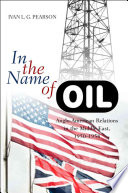
In the Name of Oil: Anglo-American Relations in the Middle East, 1950-1958
 Book by Ivan L. G. Pearson, ©2010
Book by Ivan L. G. Pearson, ©2010
Shelved in the General Collection
Call number DS 63.2 .G7P43 2010
Ivan L. G. Pearson’s In the Name of Oil: Anglo-American Relations in the Middle East, 1950-1958 provides a comprehensive analysis of the extent to which British interests in the Middle East influenced or were furthered by the United States between 1950 and 1958. The book argues that British prominence in the region ended not with the 1956 Suez Crisis, but that Britain continued to have the capacity to influence affairs in the Middle East vicariously through the United States. By utilizing original sources such as documents from the U.S. Department of State, the CIA, and the United Kingdom’s Public Head of Office, Pearson posits that the U.S. was acting in both self interest and in the interests of Britain while operating in the Middle East during this period.
In the book, two opposing schools of thought regarding the power dynamics in the Middle East during the Cold War are outlined: the traditionalist view, which argues that local powers had virtually no authority in the Middle East and therefore had no diplomatic influence over the great powers--the United States and the Soviet Union, and the regionalist view, which argues that local powers had a high amount of leverage over the great powers.
Pearson postulates that Britain should not be excluded from the "great powers" category on the basis that it held power and influence in the region by prompting U.S. foreign policy to make decisions in the U.K.’s best interests. The author then presents key ways in which he believes the British were able to influence or benefit from U.S. policy in order to protect their own interests in the region. Whether it was inspiring U.S. policymakers to develop a CIA plot to overthrow Mohammad Mosaddeq, or recommending that the United States intervene in Jordan against Arab nationalist sentiment, Pearson demonstrates that while Britain’s physical presence may have ended after the Suez Crisis, its influence still remained. While Pearson notes that the U.S. was also acting in its own interests, it was simultaneously protecting those of the United Kingdom. As a whole, Pearson’s work establishes a clear argument that British influence in the Middle East was carried out vicariously through U.S. foreign policy after the Suez Crisis.
Relevant Library of Congress Subject Headings
Subject headings are a helpful tool to use when searching library catalogs, since they use standardized forms to express certain concepts. Use any of the following terms to find library resources on related topics.
Buraymī Oasis (Oman and United Arab Emirates)
Great Britain -- Foreign relations--Middle East
Middle East -- Foreign relations
Petroleum chemicals industry -- Iran
Petroleum chemicals industry -- Iran -- History
Petroleum industry and trade -- Political aspects -- Great Britain
Petroleum industry and trade -- Political aspects -- United States
Suez Canal (Egypt) -- Strategic aspects
United States -- Foreign relations -- Middle East
More Books like In the Name of Oil, at MEI's Oman Library
Demise of the British Empire in the Middle East, ed. by Michael Cohen and Martin Kolinsky
Publication date: 1998
Shelving location: General Collection
Call number: DS 63.2 .G7D46 1998
Foundations of British Policy in the Arab World: The Cairo Conference of 1921, by Aron S. Klieman
Publication date: 1970
Shelving location: General Collection
Call number: DS 63.2 .G7 K58
The Great Powers in the Middle East, 1941-1947: The road to the Cold War, by Barry Rubin
Publication date: 1980
Shelving location: General Collection
Call number: DS 63.2 .U5 R82 1980
Margaret Thatcher and the Middle East, by Azriel Bermant
Publication date: 2016
Shelving location: General Collection
Call number: DS 63.2 .G7B47 2016
Suez, by Keith Kyle
Publication date: 1991
Shelving location: General Collection
Call number: DT 107.83 .K95 1991
The Superpowers and the Middle East, by Alan R. Taylor
Publication date: 1991
Shelving location: General Collection
Call number: DS 63.2 .U5 T39 1991
US Policy in the Gulf, 1968-1977: Aftermath of British withdrawal, by Hussein Sirriyeh
Publication date: 1984
Shelving location: General Collection
Call number: DS 63.2 .U5S58 1984
This post was originally published by William Gerhardt on March 20, 2015. It was updated in February 2021 by Daniel Diaz, and is maintained by the Oman Library at MEI.










